| Reviews & Columns |
|
Reviews DVD TV on DVD Blu-ray 4K UHD International DVDs In Theaters Reviews by Studio Video Games Features Collector Series DVDs Easter Egg Database Interviews DVD Talk Radio Feature Articles Columns Anime Talk DVD Savant Horror DVDs The M.O.D. Squad Art House HD Talk Silent DVD
|
DVD Talk Forum |
|
|
| Resources |
|
DVD Price Search Customer Service #'s RCE Info Links |
|
Columns
|
|
|
Wait Till Your Father Gets Home - The Complete First Season
When Hanna-Barbera's animated sitcom Wait Till Your Father Gets Home premiered way back in 1972, I was just a little kid, but I vividly remember watching it because, as anyone from that generation will tell you, TV only had three networks, and cartoons rarely if ever showed up in the evening hours. So when they did, it was a pretty big thing. But you had to have cool parents, though (or be left alone a lot), if you wanted to see these new, "fun adult" shows that were starting to pop up on television; you know, the naughty stuff by Norman Lear like All in the Family or Maude. So when I discovered that Hanna-Barbera was doing a night-time syndicated cartoon that played and sounded like the Bunkers, I was in heaven. Cartoons mixed with the possibility of "dirty" jokes? What more could a seven-year old want?
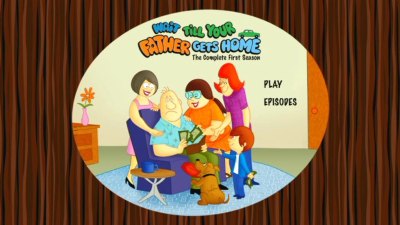
Unfortunately, I misjudged the power that cartoons had to lull parents into a false sense of security. The minute they saw this funny, ever-so-slightly adult animated sitcom, they immediately froze up, and refused to watch it again. They didn't forbid me to watch it, but they weren't too happy about it, either. And frankly, I was puzzled by their reaction. As a family, we watched All in the Family with no problems, but translate some of those same concerns into bright, colorful, seemingly innocent cartoon form, and Mom and Dad started to frown. I didn't understand at the time that the vast majority of mainstream cartoons had never touched on these subjects before (obviously, I'm not talking about underground stuff like Fritz the Cat, which, as curious kids, we were dying to see). Cartoons, to my parents, were supposed to be our safe havens from the cares of the world; when they saw the same tensions that were occurring in our own house acted out in a stupid cartoon, they just shut down. How times have changed, huh?
Seen today, anyone can appreciate the relative daring that went into this Hanna-Barbera effort. And by daring, I'm referring to its concept - a funny, flip, slightly suggestive sitcom that tackled some rather controversial issues occurring in the world at that time. Now let's be clear right off the bat; this isn't Family Guy. I would suspect most kids and anybody under thirty or so would find Wait Till Your Father Gets Home exceedingly tame by today's ribald, vulgar standards (and I'm a huge Family Guy fan, so don't email). Thirty years of ever-increasing taboo-breaking television have dulled most younger viewers to earlier TV milestones. And that goes for me, too, in my own time frame; I still can't my head around the fact that Lucy couldn't say the word "pregnant" on her show. That being said, Wait Till Your Father Gets Home is still a surprisingly funny show, with a admirably laid-back execution, an innovative production design, and clever writing that holds up well after thirty-five years.
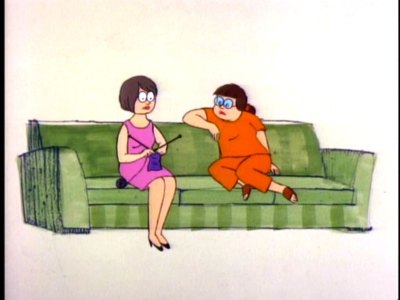
The premise of Wait Till Your Father Gets Home is as simple and stylized as its production design. Harry Boyle (Tom Bosley) is the harried middle-class head of a rapidly changing family. His two older kids are a constant muddle to him. Chet (David Hayward) is a twenty-two-year-old college graduate who plays at being a hippie (he lectures down at the "ghetto" twice a week, before coming back to the safety of Harry's couch). Alice (Kristina Holland) is the overweight daughter who's constantly chastising Harry for all his perceived prejudices and shortcomings. Harry's youngest son Jamie (Jackie Earle Haley, Willie Aames) is always there to back up his Dad - provided there's monetary compensation in it for him. And Irma Boyle (Joan Gerber) is Harry's wife, who can't seem to decide which side of the fence she should be on. Filling out Harry's extended family is Ralph Kane (Jack Burns), Harry's ultra-right-wing bigot neighbor who is constantly on the alert for invading Communists, minorities, or anyone who doesn't look or act or think exactly as he does. Each episode, Harry comes home from running his small business to find his family embroiled in some minor crisis that somehow always manages to backfire on Harry. Politics are discussed, traditions are evaluated, and new ideas are put forth until everyone agrees that the best possible course of action is take the middle ground and just get along. Everyone, that is, except Ralph.
Quite often, Wait Till Your Father Gets Home is described as some kind of battle between "right wing conservative" Harry and his "radical" kids Chet and Alice. Perhaps that's how fans remember it; after all, it's been some time since it was on (if it's played on other channels recently, I've missed it). But what struck me about Wait Till Your Father Gets Home is how even-steven most of the discussions are in the series. Harry, far from being a reactionary, is basically a nice guy, a traditionalist who can't for the life of him understand the changes that are going on his world. Most of the comedy comes from other characters misunderstanding him - or downright accusing him of prejudices he doesn't hold - and his frustrated efforts to have his own middle-of-the-road opinions heard (that's why the implied threat of the show's title and theme song never made much sense to me). The kids, though sporting then-fashionable rebellion against their elders, hardly come off as radicals. Chet seems in his own world, most of the time; Alice is the instigator of most of the accusations against Harry, and even then, she usually comes around to seeing Harry's point of view, just as Harry does in turn with his kid's beliefs. Despite all the teases and suggestions that Wait Till Your Father Gets Home is going to be some kind of radical attack on accepted social mores, it ultimately comes off as fairly conventional in its ideals.
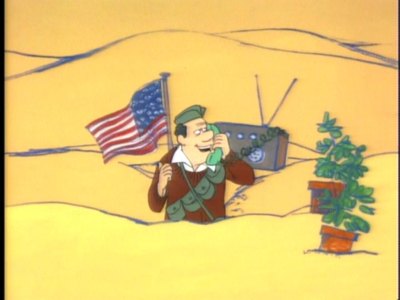
Even the extreme characters in Wait Till Your Father Gets Home; specifically wild bigot neighbor Ralph Kane and his vigilante group, wind up being softened by the comedic elements of the series. Ralph, a full-scale racist, spouts some funny lines (voiced by the incomparable Jack Burns) that will make today's touchy, P.C., nanny-cultured crowd go running for the nearest ACLU chapter (of course, if Ralph wasn't white, his ridiculous racist rants would be called "relevant" today). But clearly, the Ralph character is set-up as a comedic foil for Harry, to illustrate how mild and good natured and essentially fair he is. It's satire, after all. The writers of Wait Till Your Father Gets Home achieve this effect neatly by having Ralph's greatest worry being the Communists infiltrating the U.S. - a notion in 1972 that seemed ridiculously passe and silly.
But Wait Till Your Father Gets Home doesn't save the satirical barbs just for the conservative targets; the so-called "revolution" that was coming to America in 1972 gets its fair share of skewering, too. Liberal sacred cows of 1972 get jabbed, as well, including communes, hippies, nudists, draft-dodgers, welfare, "self-expression," feel-good adultery, and no-guilt pornography all get razzed in Wait Till Your Father Gets Home. Chet is probably the best example of Wait Till Your Father Gets Home's wide-ranging irony. The closest thing to a hippie on the show, this free spirit talks the talk, but he walks the walk at home, frequently on the couch, without an ounce of ambition, while all his considerable bills are paid by Mom and Dad (not exactly an unfair portrait of most of the people I knew who called themselves "hippies" when I was a kid). The episode Help Wanted clearly shows the series' willingness to play fair when it shows the insanity that comes to Harry when everyone wrongly assumes he's a bigot, demanding that he hire a minority for his new delivery driver. Advocacy groups from every walk of life inundate Harry while his family berates him for his non-existent prejudices - until he finally hires back his old driver: an elderly Jewish man who's constantly smashing up the van. Anybody tuning into Wait Till Your Father Gets Home just to watch Harry "get his," like they regularly did for Archie's weekly comeuppance on All in the Family, were probably laughing at their own self-portraits, too. And that's really the key to Wait Till Your Father Gets Home's success: it's still funny. Produced by H-B regulars (and writers for the similarly-toned Love, American Style) R. S. Allen and Harvey Bullock, Wait Till Your Father Gets Home has some deftly timed give-and-take jokes and dialogue that play soft and easy with the viewer. For a supposedly ground-breaking show, it's pretty genial in its humor, and all the more welcome for that tone. Some may hate that laugh track, but if anything, it gives Wait Till Your Father Gets Home even more of an "established" sitcom feel.
Another pleasing aspect of Wait Till Your Father Gets Home is the stylized approach to the animation. Veering away from the detailed look of say, a Johnny Quest Hanna-Barbera, Wait Till Your Father Gets Home incorporates the blobby look of the magazine cartoon. The characters were designed by Playboy regular Marty Murphy, and further stylized by H-B genius, Iwao Takamoto. Discarding all but the most basic identifiers for the backgrounds (a cost-cutting measure, too, no doubt), scenes appear often to be floating in mid-air, with only a couch or a table in the background to give perspective to the characters. It really lightens up the show, giving it a clean, abstract look that fits surprisingly well with the laid-back vocal tracks (Bosley is perfect at the resigned Harry).
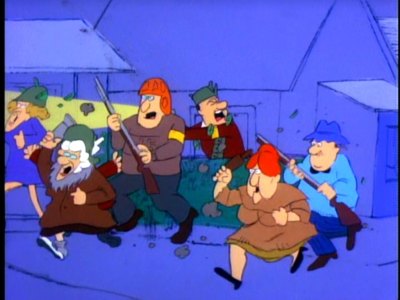
DISC ONE
The Fling
When Harry has to stay at a motel with a client, the family immediately assumes he's having ana affair.
Alice's Dress
When Harry's to receive an award, Alice decides to go formal -- with a see-through top.
The Hippie
Chet's hippie friend stays at the Boyles, and never leaves, prompting Harry to try on the hippie lifestyle.
The Beach Vacation
Harry is outraged when his two-week vacation at the beach is ruined by friendly nudist neighbors.
Help Wanted
When Harry needs a new truck driver, his family insists he hire a minority.
Love Story
Alice falls for Mr. Right -- a panhandler.
DISC TWO
The Victim
Harry gets mugged, and his family sticks up for the perp.
Chet's Job
Despite years of resistance, Chet finally takes a job, with surprising results.
Chet's Fiancé
How did hippie Chet ever get that good-looking, prim-and-proper girlfriend? And what will Harry say when they decided to live together before marriage?
The Mouse
Jamie gets a pet mouse, but the family -- particularly the women -- are dead set against it.
Duty Calls
Chet is drafted, but will Harry go in his place?
Expectant Papa
Harry and Irma are happy to be expecting a new child, until the older ones say it's "population pollution."
DISC THREE
The New Car
Harry gets ripped off on a new car, and decides to take his revenge (there's a weird disclaimer on this episode, disavowing any connection with real people being portrayed in the episode, that must have stemmed from a lawsuit -- it's a vintage disclaimer, too; not new).
The New House
Harry's new house turns out to be a gigantic pain in his...wallet.
The Prowler
A prowler is loose in the streets, and Ralph and his vigilante force are ready for him.
Mama's Identity
The Feminine Mystique comes to Irma, and Harry's not buying it.
Papa the Patient
Harry doesn't know what's worse: the pains in his stomach, or the trial of going through the health care system.
The Swimming Pool
Harry makes the mistake of trying to please his family -- by buying a trouble-laden swimming pool.
DISC FOUR
Sweet Sixteen
Alice's sixteenth birthday party rapidly spins out of control when a party planner takes over.
The Commune
Alice decides to leave school and live on a commune.
The Music Tycoon
Chet decides to become a rock band manager.
Accidents Will Happen
Should Harry cheat the insurance company when he gets a tiny injury?
Papa in New York
Harry goes to New York City -- with the whole family in tow.
The Neighbors
In what appears to be a potential spin-off, Harry introduces us to a young couple and their tribulations when they first live together.
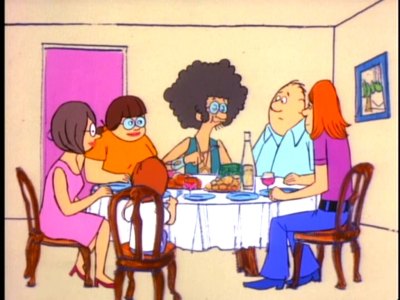
The DVD:
The Video:
The full screen DVD transfer for Wait Till Your Father Gets Home: The Complete First Season looks surprising bright and colorful. There are a lot of dirt specks and anomalies, but it's clear that those are present in the original materials, no doubt from the breakneck speed in which these cheaply produced cartoons were made. One episode, The Prowler, is really, really dark, but again, it appears to be a problem with the original materials, not the DVD transfer.
The Audio:
The Dolby Digital English mono track accurately reflects the original broadcast presentation. Dialogue is clear and sharp. Close-captioning is available.
The Extras:
There are two short featurettes included on the Wait Till Your Father Gets Home: The Complete First Season box set. First, a ten minute short called Animation for a Nation makes some ridiculous generalizations about America in the early 70s, and then barely mentions the show. Why am I listening to former California Gray Davis and Leif Garrett talk about hippies here? A much better short, Illustrating the Times, comes in at six and a half minutes, and features new interviews with the recently deceased Iwao Takamoto and graphic designer Marty Murphy. Great background on the show, and some good insights.
Final Thoughts:
Hanna-Barbera's groundbreaking Wait Till Your Father Gets Home: The Complete First Season is not the radical attack on America that you've read about; it's much more genial and middle-of-the-road, with its targets carefully spread about both liberal and conservative fields. It's still funny, and the stylized production design is a nice step forward for Hanna-Barbera. Don't expect Family Guy, and you might just like its easy-going approach to some surprisingly adult themes. I recommend Wait Till Your Father Gets Home: The Complete First Season.
Paul Mavis is an internationally published film and television historian, a member of the Online Film Critics Society, and the author of The Espionage Filmography.


|
| Popular Reviews |
| Sponsored Links |
|
|
| Sponsored Links |
|
|
| Release List | Reviews | Shop | Newsletter | Forum | DVD Giveaways | Blu-Ray | Advertise |
|
Copyright 2024 DVDTalk.com All Rights Reserved. Legal Info, Privacy Policy, Terms of Use,
Manage Preferences,
Your Privacy Choices | |||||||














